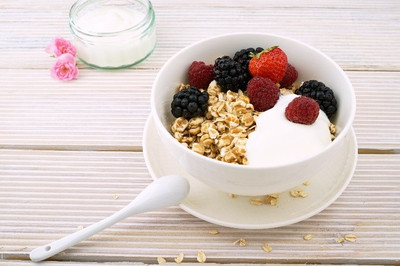
The 9 Healthiest Foods for Women
Posted by Spinning® on Apr 26th 2018
With National Women's Month at our heels and Mother’s Day around the corner, we're sharing some of the best foods for women that are both delicious and nutritious.
Whether working full-time as a parent, at the office, or balancing both jobs, it can be easy to fall into unhealthy habits like going for the quick snack or not getting enough sleep. So when it comes time to prepare meals, consider these foods that will boost not just women's, but also entire families' overall health and wellness.
Breakfast
Yogurt – Osteoporosis and a loss of bone density affects more than half of women over 50 year of age.1 So getting our daily dose of calcium is essential. One serving of yogurt supplies nearly 1/4 of a woman’s daily calcium needs. In particular, look for Greek yogurt, which is rich in probiotics to help our digestive health, and fat-free yogurt, which contains 1/3 of our daily protein needs.
Suggested Serving: Three servings per day, one per meal.
Blueberries – Packed with fiber, antioxidants and phytonutrients, blueberries are one of nature’s few “anti-aging” foods. In addition to the antioxidants fighting wrinkles and other signs of aging, a study conducted by Harvard Medical School concluded that older adults with a diet rich in blueberries are less likely to suffer from cognitive decline2. And if possible, look for wild blueberries: A study found that wild blueberries contain more powerful forms of antioxidants than frozen or canned berries. But in general, all blueberries provide the same incredible benefits.
Suggested Serving: A half-cup to a full-cup per day for the perfect mid-morning snack.
Oats – While they may not be as indulgent at pancakes and waffles, the rolled and ground oats in oatmeal are rich in B vitamins, omega-3 fatty acids, folate and potassium. A Harvard study of more than 68,000 women found that the participants who consumed more fiber daily were 23 percent less likely to develop heart disease than were those who consumed less fiber. And the soluble fiber content of oats has been found to help lower cholesterol3.
Suggested Serving: Oats and other whole grains are great for breakfast every day.
Lunch
Avocados – Don’t let the nutritional facts scare you; although avocados may be packed with fats, they are monounsaturated fatty acids, which actually help you to lose stubborn fat around your midsection. Avocados also contain a high amount of fiber, potassium, magnesium, folate and protein, as well as vitamins B-6, E and K.
Suggested Serving: 1/4 to 1/2 an avocado per day—the perfect amount for avocado toast!
Walnuts – Heart disease remains the largest cause of death worldwide, affecting more than one in four women. Thankfully, walnuts can become your shield in the fight against heart disease. Brimming with vitamins, minerals, omega-3s fatty acids and antioxidants, consuming only a handful of walnuts per day can help lower cholesterol. Another study also revealed that walnuts may even lower the risk of breast cancer in mice.
Suggested Serving: 1 ounce of walnuts (about 6 walnuts) per day.
Dinner
Salmon – All oily fish deliver two kinds of heart-healthy Omega-3s, which help combat heart disease and arthritis. But the venerable salmon contains DHA, a fatty acid essential for a healthy pregnancy. They are also rich in vitamins A and D, which many women may lack.
Suggested Serving: At least two servings per week, so plan out your dinners to make sure that salmon or other oily fish are included.
Broccoli – This mighty green vegetable is essential for women (and men!) of all ages. Research shows the minerals found in broccoli may help prevent breast cancer by fighting excess estrogen. Broccoli is also high in vitamin C and a good source of vitamin A. Not only that, but broccoli decreases the appetite to combat overeating, and it contains fiber, folic acid, calcium, iron and potassium.
Suggested Serving: Two or more half-cup servings per week.
Red Kidney Beans – All beans are nutritious, but we’re putting red kidney beans at the top of the list for a few key reasons. They are high in protein, antioxidants, folate, fiber and resistant starch, which boosts the body’s ability to burn fat. It also helps regulate blood sugar5.
Suggested Serving: Three cups of red beans per week. Bonus: It’s a great substitute for starches at dinner.
Dessert!
Dark Chocolate – If you do feel like indulging in a little after-dinner snack, consider dark chocolate. Not only is it packed with magnesium, copper, zinc and phosphorus for strong bones, but dark chocolate also contains polyphenols and flavanols, two anti-inflammatory compounds that help protect the heart.
Suggested Serving: One-quarter ounce per day of at least 70% cocoa.
Have any other healthy foods and meals for our families this month? Share them in the comments or on the official Spinning® Facebook page!
References
- Downs, Robert W. “Osteoporosis.” Healthy Women. Retrieved April 20, 2018. Found at: http://www.healthywomen.org/condition/osteoporosi...
- Breteler, Monique M. B., Devore, Elizabeth E., Grodstein, Francine ScD, Kang, Jae Hee. “Dietary intakes of berries and flavonoids in relation to cognitive decline.” Wiley Online Library. Retrieved April 26, 2012. Found at: https://onlinelibrary.wiley.com/doi/full/10.1002/...
- Nordqvist, Christian. “What are the top healthy foods?” Medical News Today. Retrieved June 20, 2017. Found at: https://www.medicalnewstoday.com/articles/245259....
- Nichols, Hannah. “What are the causes and types of arthritis?” Medical News Today. Retrieved November 14, 2017. Found at: https://www.medicalnewstoday.com/articles/7621.ph...
- Messina, Virginia. “Nutritional and health benefits of dried beans.” The American Journal of Clinical Nutrition, Volume 100, Issue suppl_1, 1 July 2014, Pages 437S–442S, https://doi.org/10.3945/ajcn.113.071472
